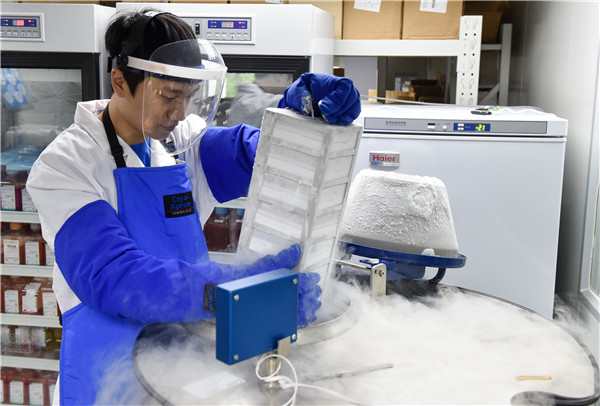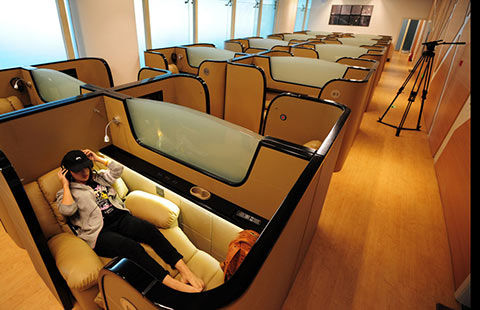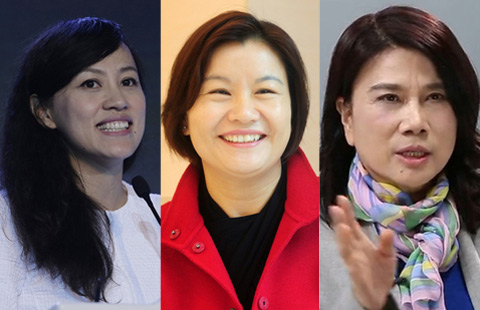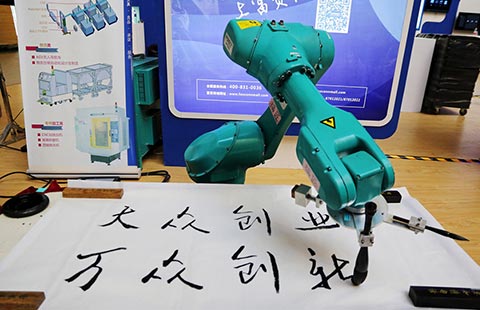First national gene bank opens
By CHAI HUA (China Daily) Updated: 2016-09-23 09:58
 |
|
A scholar at the China National GeneBank puts gene samples into liquid nitrogen for preservation.XINHUA |
National GeneBank, the country's first national gene bank, was officially put into use on Thursday. The complex is expected to offer strong support to the development of the genetics industry.
Located in Shenzhen, Guangdong province, the billion-dollar CNGB covers an area of 47,500 square meters with a unique design like terraced fields and has saved more than 10 million bio-samples with a data storage capacity of 20 petabytes for phase I.
One petabyte is about 400 billion pages of word documents.
It is the world's fourth national-level gene bank. The other three are in the US, Europe and Japan.
Wang Jian, president of Shenzhen-based genetic sequencing firm BGI, said: "The CNGB's data will be open to society, providing strong support to the development of the genetics industry."
China's genetic sequencing market, one of the most important aspects of the industry, in 2016 has become the largest in the world with an annual growth rate of above 20 percent, according to research firm iResearch Consulting Group.
To further support the development of the industry, the National Development and Reform Commission in 2011 approved the establishment of CNGB and entrusted BGI-Research with its construction.
Mei Yonghong, former mayor of Jining in Shandong province who is now director of CNGB, said he believes the gene bank can link all elements of gene-related fields, from resources and scientific research to applications in different industries, such as precision medicine and agriculture.
At the opening ceremony, CNGB signed cooperation agreements with some international and local partners, such as Svalbard Global Seed Vault, German Cancer Research Center, Shenzhen Institute of Advanced Technology and Huawei Technologies, which provides data storage service for the bank.
Lyu Jiancheng, vice director of SIAT, said the CNGB will help them to write genes of 10 million phages (a kind of virus) so that they can make new reagents and develop new medicines.
The opening of the gene platform will also reduce costs in the genetic industry, thanks to home made equipment with high precision.
The world leading gene company Illumina has managed to practice individual genetic sequencing within the cost of below $1,000 in 2014, but Mei Yonghong said the aim of CNGB is 1,000 yuan ($152).
BGI's new genetic sequencing equipment BGISEQ-500, which is expected to hit the market in October and the price is said to be one third of its counterparts.
CNGB owns 150 sets of the equipment now and the platform could satisfy the gene sequencing needs of 50,000 people.
Xu Xun, executive director of CNGB, disclosed the machine is completely manufactured in Shenzhen-an important reason for its low price, and more models of their genetic sequencing equipment will be released in November.
- Chemical giant shows wares at industry fair
- ChemChina launches new e-commerce portal
- First national gene bank opens
- Baidu set to lose leading role in digital advertising
- China lifts ban on US beef products
- Wanda, Sony said to be close to movie alliance
- Hyundai to debut Genesis premium brand in China in 2-3 years -exec
- Yahoo says hackers stole data from 500m accounts in 2014

















